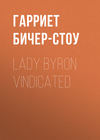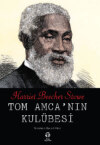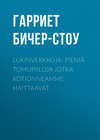Kitabı oku: «Lady Byron Vindicated», sayfa 10
CHAPTER III. CHRONOLOGICAL SUMMARY OF EVENTS
I have now fulfilled as conscientiously as possible the requests of those who feel that they have a right to know exactly what was said in this interview.
It has been my object, in doing this, to place myself just where I should stand were I giving evidence under oath before a legal tribunal. In my first published account, there were given some smaller details of the story, of no particular value to the main purpose of it, which I received not from Lady Byron, but from her confidential friend. One of these was the account of her seeing Lord Byron’s favourite spaniel lying at his door, and the other was the scene of the parting.
The first was communicated to me before I ever saw Lady Byron, and under these circumstances:—I was invited to meet her, and had expressed my desire to do so, because Lord Byron had been all my life an object of great interest to me. I inquired what sort of a person Lady Byron was. My friend spoke of her with enthusiasm. I then said, ‘but of course she never loved Lord Byron, or she would not have left him.’ The lady answered, ‘I can show you with what feelings she left him by relating this story;’ and then followed the anecdote.
Subsequently, she also related to me the other story of the parting-scene between Lord and Lady Byron. In regard to these two incidents, my recollection is clear.
It will be observed by the reader that Lady Byron’s conversation with me was simply for consultation on one point, and that point whether she herself should publish the story before her death. It was not, therefore, a complete history of all the events in their order, but specimens of a few incidents and facts. Her object was, not to prove her story to me, nor to put me in possession of it with a view to my proving it, but simply and briefly to show me what it was, that I might judge as to the probable results of its publication at that time.
It therefore comprised primarily these points:—
1. An exact statement, in so many words, of the crime.
2. A statement of the manner in which it was first forced on her attention by Lord Byron’s words and actions, including his admissions and defences of it.
3. The admission of a period when she had ascribed his whole conduct to insanity.
4. A reference to later positive evidences of guilt, the existence of a child, and Mrs. Leigh’s subsequent repentance.
And here I have a word to say in reference to the alleged inaccuracies of my true story.
The dates that Lady Byron gave me on the memoranda did not relate either to the time of the first disclosure, or the period when her doubts became certainties; nor did her conversation touch either of these points: and, on a careful review of the latter, I see clearly that it omitted dwelling upon anything which I might be supposed to have learned from her already published statement.
I re-enclosed that paper to her from London, and have never seen it since.
In writing my account, which I designed to do in the most general terms, I took for my guide Miss Martineau’s published Memoir of Lady Byron, which has long stood uncontradicted before the public, of which Macmillan’s London edition is now before me. The reader is referred to page 316, which reads thus:—
‘She was born 1792; married in January 1814; returned to her father’s house in 1816; died on May 16, 1860.’ This makes her married life two years; but we need not say that the date is inaccurate, as Lady Byron was married in 1815.
Supposing Lady Byron’s married life to have covered two years, I could only reconcile its continuance for that length of time to her uncertainty as to his sanity; to deceptions practised on her, making her doubt at one time, and believe at another; and his keeping her in a general state of turmoil and confusion, till at last he took the step of banishing her.
Various other points taken from Miss Martineau have also been attacked as inaccuracies; for example, the number of executions in the house: but these points, though of no importance, are substantially borne out by Moore’s statements.
This controversy, unfortunately, cannot be managed with the accuracy of a legal trial. Its course, hitherto, has rather resembled the course of a drawing-room scandal, where everyone freely throws in an assertion, with or without proof. In making out my narrative, however, I shall use only certain authentic sources, some of which have for a long time been before the public, and some of which have floated up from the waves of the recent controversy. I consider as authentic sources,—
Moore’s Life of Byron;
Lady Byron’s own account of the separation, published in 1830;
Lady Byron’s statements to me in 1856;
Lord Lindsay’s communication, giving an extract from Lady Anne Barnard’s diary, and a copy of a letter from Lady Byron dated 1818, about three years after her marriage;
Mrs. Mimms’ testimony, as given in a daily paper published at Newcastle, England;
And Lady Byron’s letters, as given recently in the late ‘London Quarterly.’
All which documents appear to arrange themselves into a connected series.
From these, then, let us construct the story.
According to Mrs. Mimms’ account, which is likely to be accurate, the time spent by Lord and Lady Byron in bridal-visiting was three weeks at Halnaby Hall, and six weeks at Seaham, when Mrs. Mimms quitted their service.
During this first period of three weeks, Lord Byron’s treatment of his wife, as testified to by the servant, was such that she advised her young mistress to return to her parents; and, at one time, Lady Byron had almost resolved to do so.
What the particulars of his conduct were, the servant refuses to state; being bound by a promise of silence to her mistress. She, however, testifies to a warm friendship existing between Lady Byron and Mrs. Leigh, in a manner which would lead us to feel that Lady Byron received and was received by Lord Byron’s sister with the greatest affection. Lady Byron herself says to Lady Anne Barnard, ‘I had heard that he was the best of brothers;’ and the inference is, that she, at an early period of her married life, felt the greatest confidence in his sister, and wished to have her with them as much as possible. In Lady Anne’s account, this wish to have the sister with her was increased by Lady Byron’s distress at her husband’s attempts to corrupt her principles with regard to religion and marriage.
In Moore’s Life, vol. iii., letter 217, Lord Byron writes from Seaham to Moore, under date of March 8, sending a copy of his verses in Lady Byron’s handwriting, and saying, ‘We shall leave this place to-morrow, and shall stop on our way to town, in the interval of taking a house there, at Colonel Leigh’s, near Newmarket, where any epistle of yours will find its welcome way. I have been very comfortable here, listening to that d–d monologue which elderly gentlemen call conversation, in which my pious father-in-law repeats himself every evening, save one, when he played upon the fiddle. However, they have been vastly kind and hospitable, and I like them and the place vastly; and I hope they will live many happy months. Bell is in health and unvaried good-humour and behaviour; but we are in all the agonies of packing and parting.’
Nine days after this, under date of March 17, Lord Byron says, ‘We mean to metropolize to-morrow, and you will address your next to Piccadilly.’ The inference is, that the days intermediate were spent at Colonel Leigh’s. The next letters, and all subsequent ones for six months, are dated from Piccadilly.
As we have shown, there is every reason to believe that a warm friendship had thus arisen between Mrs. Leigh and Lady Byron, and that, during all this time, Lady Byron desired as much of the society of her sister-in-law as possible. She was a married woman and a mother, her husband’s nearest relative; and Lady Byron could with more propriety ask, from her, counsel or aid in respect to his peculiarities than she could from her own parents. If we consider the character of Lady Byron as given by Mrs. Mimms, that of a young person of warm but repressed feeling, without sister or brother, longing for human sympathy, and having so far found no relief but in talking with a faithful dependant,—we may easily see that the acquisition of a sister through Lord Byron might have been all in all to her, and that the feelings which he checked and rejected for himself might have flowed out towards his sister with enthusiasm. The date of Mrs. Leigh’s visit does not appear.
The first domestic indication in Lord Byron’s letters from London is the announcement of the death of Lady Byron’s uncle, Lord Wentworth, from whom came large expectations of property. Lord Byron had mentioned him before in his letters as so kind to Bell and himself that he could not find it in his heart to wish him in heaven if he preferred staying here. In his letter of April 23, he mentions going to the play immediately after hearing this news, ‘although,’ as he says, ‘he ought to have stayed at home in sackcloth for “unc.”’
On June 12, he writes that Lady Byron is more than three months advanced in her progress towards maternity; and that they have been out very little, as he wishes to keep her quiet. We are informed by Moore that Lord Byron was at this time a member of the Drury-Lane Theatre Committee; and that, in this unlucky connection, one of the fatalities of the first year of trial as a husband lay. From the strain of Byron’s letters, as given in Moore, it is apparent, that, while he thinks it best for his wife to remain at home, he does not propose to share the retirement, but prefers running his own separate career with such persons as thronged the greenroom of the theatre in those days.
In commenting on Lord Byron’s course, we must not by any means be supposed to indicate that he was doing any more or worse than most gay young men of his time. The licence of the day as to getting drunk at dinner-parties, and leading, generally, what would, in these days, be called a disorderly life, was great. We should infer that none of the literary men of Byron’s time would have been ashamed of being drunk occasionally. The Noctes Ambrosianae Club of ‘Blackwood’ is full of songs glorying, in the broadest terms, in out-and-out drunkenness, and inviting to it as the highest condition of a civilised being.37
But drunkenness upon Lord Byron had a peculiar and specific effect, which he notices afterwards, in his Journal, at Venice: ‘The effect of all wines and spirits upon me is, however, strange. It settles, but makes me gloomy—gloomy at the very moment of their effect: it composes, however, though sullenly.’38 And, again, in another place, he says, ‘Wine and spirits make me sullen, and savage to ferocity.’
It is well known that the effects of alcoholic excitement are various as the natures of the subjects. But by far the worst effects, and the most destructive to domestic peace, are those that occur in cases where spirits, instead of acting on the nerves of motion, and depriving the subject of power in that direction, stimulate the brain so as to produce there the ferocity, the steadiness, the utter deadness to compassion or conscience, which characterise a madman. How fearful to a sensitive young mother in the period of pregnancy might be the return of such a madman to the domestic roof! Nor can we account for those scenes described in Lady Anne Barnard’s letters, where Lord Byron returned from his evening parties to try torturing experiments on his wife, otherwise than by his own statement, that spirits, while they steadied him, made him ‘gloomy, and savage to ferocity.’
Take for example this:—
‘One night, coming home from one of his lawless parties, he saw me (Lady B.) so indignantly collected, and bearing all with such a determined calmness, that a rush of remorse seemed to come over him. He called himself a monster, and, though his sister was present, threw himself in agony at my feet. “I could not, no, I could not, forgive him such injuries! He had lost me forever!” Astonished at this return to virtue, my tears, I believe, flowed over his face; and I said, “Byron, all is forgotten; never, never shall you hear of it more.”
‘He started up, and folding his arms while he looked at me, burst out into laughter. “What do you mean?” said I. “Only a philosophical experiment; that’s all,” said he. “I wished to ascertain the value of your resolutions.”’
To ascribe such deliberate cruelty as this to the effect of drink upon Lord Byron, is the most charitable construction that can be put upon his conduct.
Yet the manners of the period were such, that Lord Byron must have often come to this condition while only doing what many of his acquaintances did freely, and without fear of consequences.
Mr. Moore, with his usual artlessness, gives us an idea of a private supper between himself and Lord Byron. We give it, with our own italics, as a specimen of many others:—
‘Having taken upon me to order the repast, and knowing that Lord Byron for the last two days had done nothing towards sustenance beyond eating a few biscuits and (to appease appetite) chewing mastic, I desired that we should have a good supply of at least two kinds of fish. My companion, however, confined himself to lobsters; and of these finished two or three, to his own share, interposing, sometimes, a small liqueur-glass of strong white brandy, sometimes a tumbler of very hot water, and then pure brandy again, to the amount of near half a dozen small glasses of the latter, without which, alternately with the hot water, he appeared to think the lobster could not be digested. After this, we had claret, of which, having despatched two bottles between us, at about four o’clock in the morning we parted.
‘As Pope has thought his “delicious lobster-nights” worth commemorating, these particulars of one in which Lord Byron was concerned may also have some interest.
‘Among other nights of the same description which I had the happiness of passing with him, I remember once, in returning home from some assembly at rather a late hour, we saw lights in the windows of his old haunt, Stevens’s in Bond Street, and agreed to stop there and sup. On entering, we found an old friend of his, Sir G– W–, who joined our party; and, the lobsters and brandy and water being put in requisition, it was (as usual on such occasions) broad daylight before we separated.’—Vol. iii. p.83.
During the latter part of Lady Byron’s pregnancy, it appears from Moore that Byron was, night after night, engaged out at dinner parties, in which getting drunk was considered as of course the finale, as appears from the following letters:—
(LETTER 228.)
TO MR. MOORE.‘TERRACE, PICCADILLY, OCT. 31,1815.
‘I have not been able to ascertain precisely the time of duration of the stock-market; but I believe it is a good time for selling out, and I hope so. First, because I shall see you; and, next, because I shall receive certain moneys on behalf of Lady B., the which will materially conduce to my comfort; I wanting (as the duns say) “to make up a sum.”
‘Yesterday I dined out with a large-ish party, where were Sheridan and Colman, Harry Harris, of C. G., and his brother, Sir Gilbert Heathcote, Ds. Kinnaird, and others of note and notoriety. Like other parties of the kind, it was first silent, then talky, then argumentative, then disputatious, then unintelligible, * then altogethery, then inarticulate, and then drunk. When we had reached the last step of this glorious ladder, it was difficult to get down again without stumbling; and, to crown all, Kinnaird and I had to conduct Sheridan down a d–d corkscrew staircase, which had certainly been constructed before the discovery of fermented liquors, and to which no legs, however crooked, could possibly accommodate themselves. We deposited him safe at home, where his man, evidently used to the business,39 waited to receive him in the hall.
‘Both he and Colman were, as usual, very good; but I carried away much wine, and the wine had previously carried away my memory: so that all was hiccough and happiness for the last hour or so, and I am not impregnated with any of the conversation. Perhaps you heard of a late answer of Sheridan to the watchman who found him bereft of that “divine particle of air” called reason . . . He (the watchman) found Sherry in the street fuddled and bewildered, and almost insensible. “Who are you, sir?”—No answer. “What’s your name?”—A hiccough. “What’s your name?”—Answer, in a slow, deliberate, and impassive tone, “Wilberforce!” Is not that Sherry all over?—and, to my mind, excellent. Poor fellow, his very dregs are better than the “first sprightly runnings” of others.
‘My paper is full, and I have a grievous headache.
‘P.S.—Lady B. is in full progress. Next month will bring to light (with the aid of “Juno Lucina, fer opem,” or rather opes, for the last are most wanted) the tenth wonder of the world; Gil Blas being the eighth, and he (my son’s father) the ninth.’
Here we have a picture of the whole story,—Lady Byron within a month of her confinement; her money being used to settle debts; her husband out at a dinner-party, going through the usual course of such parties, able to keep his legs and help Sheridan downstairs, and going home ‘gloomy, and savage to ferocity,’ to his wife.
Four days after this (letter 229), we find that this dinner-party is not an exceptional one, but one of a series: for he says, ‘To-day I dine with Kinnaird,—we are to have Sheridan and Colman again; and to-morrow, once more, at Sir Gilbert Heathcote’s.’
Afterward, in Venice, he reviews the state of his health, at this period in London; and his account shows that his excesses in the vices of his times had wrought effects on his sensitive, nervous organisation, very different from what they might on the more phlegmatic constitutions of ordinary Englishmen. In his journal, dated Venice, Feb. 2, 1821, he says,—
‘I have been considering what can be the reason why I always wake at a certain hour in the morning, and always in very bad spirits,—I may say, in actual despair and despondency, in all respects, even of that which pleased me over night. In about an hour or two this goes off, and I compose either to sleep again, or at least to quiet. In England, five years ago, I had the same kind of hypochondria, but accompanied with so violent a thirst, that I have drunk as many as fifteen bottles of soda-water in one night, after going to bed, and been still thirsty,—calculating, however, some lost from the bursting-out and effervescence and overflowing of the soda-water in drawing the corks, or striking off the necks of the bottles from mere thirsty impatience. At present, I have not the thirst; but the depression of spirits is no less violent.’—Vol. v. p.96.
These extracts go to show what must have been the condition of the man whom Lady Byron was called to receive at the intervals when he came back from his various social excitements and pleasures. That his nerves were exacerbated by violent extremes of abstinence and reckless indulgence; that he was often day after day drunk, and that drunkenness made him savage and ferocious,—such are the facts clearly shown by Mr. Moore’s narrative. Of the natural peculiarities of Lord Byron’s temper, he thus speaks to the Countess of Blessington:—
‘I often think that I inherit my violence and bad temper from my poor mother, not that my father, from all I could ever learn, had a much better; so that it is no wonder I have such a very bad one. As long as I can remember anything, I recollect being subject to violent paroxysms of rage, so disproportioned to the cause as to surprise me when they were over; and this still continues. I cannot coolly view any thing which excites my feelings; and, once the lurking devil in me is roused, I lose all command of myself. I do not recover a good fit of rage for days after. Mind, I do not by this mean that the ill humour continues, as, on the contrary, that quickly subsides, exhausted by its own violence; but it shakes me terribly, and leaves me low and nervous after.’—Lady Blessington’s Conversations, p.142.
That during this time also his irritation and ill temper were increased by the mortification of duns, debts, and executions, is on the face of Moore’s story. Moore himself relates one incident, which gives some idea of the many which may have occurred at these times, in a note on p.215, vol. iv., where he speaks of Lord Byron’s destroying a favourite old watch that had been his companion from boyhood, and gone with him to Greece. ‘In a fit of vexation and rage, brought upon him by some of these humiliating embarrassments, to which he was now almost daily a prey, he furiously dashed this watch on the hearth, and ground it to pieces with the poker among the ashes.’
It is no wonder, that, with a man of this kind to manage, Lady Byron should have clung to the only female companionship she could dare to trust in the case, and earnestly desired to retain with her the sister, who seemed, more than herself, to have influence over him.
The first letter given by ‘The Quarterly,’ from Lady Byron to Mrs. Leigh, without a date, evidently belongs to this period, when the sister’s society presented itself as a refuge in her approaching confinement. Mrs Leigh speaks of leaving. The young wife, conscious that the house presents no attractions, and that soon she herself shall be laid by, cannot urge Mrs. Leigh’s stay as likely to give her any pleasure, but only as a comfort to herself.
‘You will think me very foolish; but I have tried two or three times, and cannot talk to you of your departure with a decent visage: so let me say one word in this way to spare my philosophy. With the expectations which I have, I never will nor can ask you to stay one moment longer than you are inclined to do. It would [be] the worst return for all I ever received from you. But in this at least I am “truth itself,” when I say, that whatever the situation may be, there is no one whose society is dearer to me, or can contribute more to my happiness. These feelings will not change under any circumstances, and I should be grieved if you did not understand them. Should you hereafter condemn me, I shall not love you less. I will say no more. Judge for yourself about going or staying. I wish you to consider yourself, if you could be wise enough to do that, for the first time in your life.
‘Thine,
‘A. I. B.’Addressed on the cover, ‘To The Hon. Mrs. Leigh.’
This letter not being dated, we have no clue but what we obtain from its own internal evidence. It certainly is not written in Lady Byron’s usual clear and elegant style; and is, in this respect, in striking contrast to all her letters that I have ever seen.
But the notes written by a young woman under such peculiar and distressing circumstances must not be judged by the standard of calmer hours.
Subsequently to this letter, and during that stormy, irrational period when Lord Byron’s conduct became daily more and more unaccountable, may have come that startling scene in which Lord Byron took every pains to convince his wife of improper relations subsisting between himself and his sister.
What an utter desolation this must have been to the wife, tearing from her the last hold of friendship, and the last refuge to which she had clung in her sorrows, may easily be conceived.
In this crisis, it appears that the sister convinced Lady Byron that the whole was to be attributed to insanity. It would be a conviction gladly accepted, and bringing infinite relief, although still surrounding her path with fearful difficulties.
That such was the case is plainly asserted by Lady Byron in her statement published in 1830. Speaking of her separation, Lady Byron says:—
‘The facts are, I left London for Kirkby Mallory, the residence of my father and mother, on the 15th of January, 1816. Lord Byron had signified to me in writing, Jan. 6, his absolute desire that I should leave London on the earliest day that I could conveniently fix. It was not safe for me to encounter the fatigues of a journey sooner than the 15th. Previously to my departure, it had been strongly impressed on my mind that Lord Byron was under the influence of insanity.
‘This opinion was in a great measure derived from the communications made to me by his nearest relatives and personal attendant’
Now there was no nearer relative than Mrs. Leigh; and the personal attendant was Fletcher. It was therefore presumably Mrs. Leigh who convinced Lady Byron of her husband’s insanity.
Lady Byron says, ‘It was even represented to me that he was in danger of destroying himself.
‘With the concurrence of his family, I had consulted with Dr. Baillie, as a friend, on Jan. 8, as to his supposed malady.’ Now, Lord Byron’s written order for her to leave came on Jan. 6. It appears, then, that Lady Byron, acting in concurrence with Mrs. Leigh and others of her husband’s family, consulted Dr. Baillie, on Jan. 8, as to what she should do; the symptoms presented to Dr. Baillie being, evidently, insane hatred of his wife on the part of Lord Byron, and a determination to get her out of the house. Lady Byron goes on:—
‘On acquainting him with the state of the case, and with Lord Byron’s desire that I should leave London, Dr. Baillie thought my absence might be advisable as an experiment, assuming the fact of mental derangement; for Dr. Baillie, not having had access to Lord Byron, could not pronounce an opinion on that point. He enjoined, that, in correspondence with Lord Byron, I should avoid all but light and soothing topics. Under these impressions, I left London, determined to follow the advice given me by Dr. Baillie. Whatever might have been the nature of Lord Byron’s treatment of me from the time of my marriage, yet, supposing him to have been in a state of mental alienation, it was not for me, nor for any person of common humanity, to manifest at that moment a sense of injury.’
It appears, then, that the domestic situation in Byron’s house at the time of his wife’s expulsion was one so grave as to call for family counsel; for Lady Byron, generally accurate, speaks in the plural number. ‘His nearest relatives’ certainly includes Mrs. Leigh. ‘His family’ includes more. That some of Lord Byron’s own relatives were cognisant of facts at this time, and that they took Lady Byron’s side, is shown by one of his own chance admissions. In vol. vi. p.394, in a letter on Bowles, he says, speaking of this time, ‘All my relations, save one, fell from me like leaves from a tree in autumn.’ And in Medwin’s Conversations he says, ‘Even my cousin George Byron, who had been brought up with me, and whom I loved as a brother, took my wife’s part.’ The conduct must have been marked in the extreme that led to this result.
We cannot help stopping here to say that Lady Byron’s situation at this time has been discussed in our days with a want of ordinary human feeling that is surprising. Let any father and mother, reading this, look on their own daughter, and try to make the case their own.
After a few short months of married life,—months full of patient endurance of the strangest and most unaccountable treatment,—she comes to them, expelled from her husband’s house, an object of hatred and aversion to him, and having to settle for herself the awful question, whether he is a dangerous madman or a determined villain.
Such was this young wife’s situation.
With a heart at times wrung with compassion for her husband as a helpless maniac, and fearful that all may end in suicide, yet compelled to leave him, she writes on the road the much-quoted letter, beginning ‘Dear Duck.’ This is an exaggerated and unnatural letter, it is true, but of precisely the character that might be expected from an inexperienced young wife when dealing with a husband supposed to be insane.
The next day, she addressed to Augusta this letter:—
‘MY DEAREST A.,—It is my great comfort that you are still in Piccadilly.’
And again, on the 23rd:—
‘DEAREST A.,—I know you feel for me, as I do for you; and perhaps I am better understood than I think. You have been, ever since I knew you, my best comforter; and will so remain, unless you grow tired of the office,—which may well be.’
We can see here how self-denying and heroic appears to Lady Byron the conduct of the sister, who patiently remains to soothe and guide and restrain the moody madman, whose madness takes a form, at times, so repulsive to every womanly feeling. She intimates that she should not wonder should Augusta grow weary of the office.
Lady Byron continues her statement thus:—
‘When I arrived at Kirkby Mallory, my parents were unacquainted with the existence of any causes likely to destroy my prospects of happiness; and, when I communicated to them the opinion that had been formed concerning Lord Byron’s state of mind, they were most anxious to promote his restoration by every means in their power. They assured those relations that were with him in London that “they would devote their whole case and attention to the alleviation of his malady.”’
Here we have a quotation40 from a letter written by Lady Milbanke to the anxious ‘relations’ who are taking counsel about Lord Byron in town. Lady Byron also adds, in justification of her mother from Lord Byron’s slanders, ‘She had always treated him with an affectionate consideration and indulgence, which extended to every little peculiarity of his feelings. Never did an irritating word escape her lips in her whole intercourse with him.’
Now comes a remarkable part of Lady Byron’s statement:—
‘The accounts given me after I left Lord Byron, by those in constant intercourse with him,41 added to those doubts which had before transiently occurred to my mind as to the reality of the alleged disease; and the reports of his medical attendants were far from establishing anything like lunacy.’
When these doubts arose in her mind, it is not natural to suppose that they should, at first, involve Mrs. Leigh. She still appears to Lady Byron as the devoted, believing sister, fully convinced of her brother’s insanity, and endeavouring to restrain and control him.










